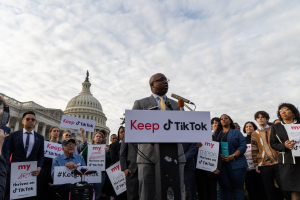A congressional bill that could ban TikTok may mean a drop in revenue and a loss of opportunities for content creators at Georgetown University.
The House of Representatives passed a bipartisan bill on March 13 that would require TikTok’s parent company ByteDance to sell TikTok within six months or have the app banned from all U.S. devices if the bill makes it through the Senate and becomes law. 170 million Americans are on TikTok, including around two-thirds of teenagers, with many using the app as a source of income.
Grace Rivers (CAS ’24), a content creator on the app, said a potential ban on TikTok disheartened her.
“I am very privileged to make money on the platform, yet the constant threat of a ban makes this income precarious,” Rivers wrote to The Hoya. “For me personally, I will continue to create as usual, but there is always the looming thought that each post could be my last.”
Note: Grace Rivers (CAS ’24) was a columnist for The Hoya.
Joey Trigiani (MSB ’26), another content creator, said he was not as worried about the ban, as he uses TikTok as a part-time method to supplement his income.
“A ban wouldn’t affect my creation or income too much as I post on TikTok as more of a side hustle,” Trigiani wrote to The Hoya. “However, I recognize that some people rely solely on TikTok for their income. I think a ban would be very difficult for small businesses and brands that reside mainly on the app.”
Caroline Timoney (CAS ’23), a part-time content creator, said TikTok’s unique algorithm allows her to reach audiences that other apps do not.
“I still think the TikTok algorithm is really unique and has an ability to reach new people and it has a level of specificity that I don’t think even Instagram with reels has,” Timoney told The Hoya.
Trigiani said the ban on TikTok would affect his daily life but that it would benefit him by cutting his screen time.
“It would definitely be very strange if it just went away,” Trigiani wrote. “I mostly use TikTok for entertainment, and I would definitely miss scrolling on the app if it were to go away,” Trigiani wrote. “However, I think this shows us that maybe we could all use a step away from the app and back towards reality.”
The bill’s lead sponsors have argued that TikTok may present a danger to user privacy and national security because of ByteDance’s connections to the Chinese Communist Party.

Rep. Mike Gallagher (GRD ’12, ’15, R-Wisc.) told reporters that potential Chinese government influence on TikTok presents threats to U.S. security.
“This is about foreign adversary control of American social media and, by extension, the dominant news platform for young Americans, and the risks of that I think are just too great,” Gallagher told C-SPAN.
Margot Barrett (MSB ’26), who works as director of community at Georgetown Ventures, the student entrepreneur funding club, has used TikTok both as a content creator as well as to identify trends and discover customers for startups her club works with.
Barrett said TikTok users will simply turn to other apps if Congress bans the platform.
“If TikTok gets banned, another similar platform will likely arise; maybe people will transfer to Instagram Reels,” Barrett wrote to The Hoya. “I will likely follow suit to this transfer; as both a producer and consumer of TikTok content, I, like many other users, have become addicted to consuming short-format videos.”
Sophia Pezeshkan (SFS ’26), a congressional intern, said her office has received many calls from constituents concerned about the proposed ban.
“We’ve definitely been getting a crazy amount of calls specifically about this bill, from both sides,” Pezeshkan told The Hoya. “From a younger audience about not wanting TikTok banned and, at the same time, we’ve also been getting a lot of calls typically from older audiences who are in support of banning TikTok.”
Pezeshkan said many of these callers have argued that banning TikTok violates their First Amendment right to free expression.
“Usually when people call in support of TikTok not being banned, they are saying that it goes against their constitutional right,” Pezeshkan told The Hoya.
Barrett said TikTok has allowed her to build a community with friends and neighbors in her hometown of Los Angeles.
“The platform allowed many of my good friends to change their financial situations and pursue creative pathways that, in the past, were not profitable,” Barrett wrote. “It allowed me to discover niche aspects of my city that I had not realized were there – I found local stores, hidden hikes and adventures, and creators who are now my close friends.”








